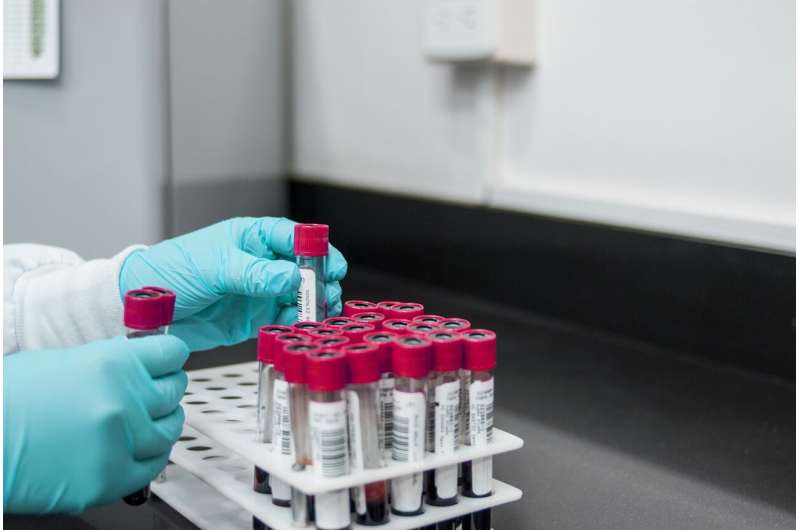This article has been reviewed according to Science X's editorial process and policies. Editors have highlighted the following attributes while ensuring the content's credibility:
fact-checked
peer-reviewed publication
trusted source
proofread
Blood hormone levels identify which post-menopausal women will benefit most from a medication to prevent breast cancer

Research led by Queen Mary University of London's Wolfson Institute of Population Health has found that hormone levels, measured through blood tests, are an important indicator of whether women will benefit from recently licensed medication for the prevention of breast cancer.
Aromatase inhibitors such as anastrozole are recommended by the National Institute of Clinical Care and Excellence (NICE) as an option for preventive therapy in post-menopausal women at high risk of breast cancer. Anastrozole (Arimidex) is now also licensed by the Medicines and Healthcare products Regulatory Agency (MHRA) for breast cancer prevention. The study, published Dec. 6 in Lancet Oncology, could lead to better ways to identify those post-menopausal women who would most benefit from these drugs.
One in seven women in the UK will develop breast cancer, with almost 56,000 cases diagnosed every year. Post-menopausal women who have higher concentrations of the hormone estrogen in their bloodstream are at higher risk of developing breast cancer. Aromatase inhibitors stop the production of estrogen and reduce the amount made in the body. They are currently the most effective preventive agent for estrogen-receptor positive breast cancer, but their utility could be increased by identifying those who stand to benefit most by taking these drugs.
Led by Professor Jack Cuzick at Queen Mary University of London, an international team of authors from the UK, Australia, Finland, Germany, Italy, and the U.S. tested whether measuring estrogen in the blood could identify which women at increased risk of breast cancer will benefit most from the preventive effects of an aromatase inhibitor. They analyzed data from the IBIS-II prevention trial, an international randomized controlled trial of anastrozole in high-risk post-menopausal women conducted from 2003 to 2012.
In their analysis of a case-control study of 212 women (72 cases, 140 controls) there was a clear trend of increasing risk with increasing hormone levels in the placebo group, but not in the anastrozole group. A 55% reduction in risk of developing cancer was seen in three-quarters of the women receiving anastrozole, but a much lower reduction was seen in those in the bottom 25% of estradiol levels.
These data suggest that inexpensive blood tests to measure hormones could be used to identify women who will benefit most from preventive therapy with an aromatase inhibitor. This personalization would allow for women to receive the medication that would offer them the best balance of managing cancer risk and side effects.
Professor Jack Cuzick said, "These results are very exciting, and can refine how we choose preventive medication for post-menopausal women at high risk of breast cancer. In our study the 25% of these women with the lowest estradiol measurements benefitted little from taking anastrozole, while still suffering from the side effects of the drug."
"A simple blood hormone test could improve the benefit of anastrozole if we use it to select the patients best suited to take it. We now need to routinely assess hormone levels in post-menopausal women at high breast cancer risk before prescribing anastrozole, to identify those who are at greatest risk and will respond well."
Dr. David Crosby, head of prevention and early detection at Cancer Research UK, said, "It was really exciting when anastrozole was approved by NICE as a preventive treatment for some women at high risk of breast cancer."
"This research now gives us some clues about which women would benefit most from the drug, while identifying women who won't benefit and can be spared unnecessary side effects. Cancer Research UK carried out some of the key work on developing these drugs, known as 'aromatase inhibitors.' It's an area with a lot of potential, and larger trials building on the results in this study will be key to further understanding who is most likely to benefit."
Professor Cuzick is a researcher in the prevention and treatment of breast cancer, and is the author of more than 500 peer-reviewed papers. Among other important breakthroughs, his research led to the use of tamoxifen as a prophylactic treatment for women at risk of breast cancer, and he led the IBIS-II trial to examine the efficacy of the aromatase inhibitor, anastrozole, in the prevention of this disease.
More information: Effect of baseline oestradiol serum concentration on the efficacy of anastrozole for preventing breast cancer in postmenopausal women at high risk: a case-control study of the IBIS-II prevention trial, The Lancet Oncology (2023). DOI: 10.1016/S1470-2045(23)00578-8. www.thelancet.com/journals/lan … (23)00578-8/fulltext




















